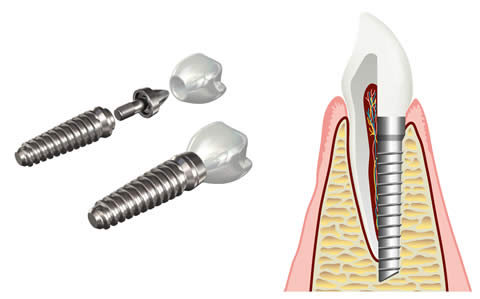Dental Implant Aftercare – Advice From The Acton Vale Team

Dental implants are very robust but you still need to look after them. Here’s how….
If you lose a tooth, whether through damage or decay, you will most likely take a look at the various options for replacing it. These options include dentures, a bridge or, increasingly, dental implants. This latter option is, in our opinion, the strongest and most secure replacement tooth which also has excellent longevity, often lasting for twenty years or more providing that good care is taken of them. It is this last aspect that we are going to look at in today’s blog.
We all know that if we don’t brush and floss our teeth, problems like tooth decay will almost inevitably follow. As dental implants are made from man made materials though, it can be tempting to think that they don’t need much, if any, maintenance. This would be a very big mistake and anyone taking this approach with an implant is likely to have problems and may well even lose it altogether.
The care that needs to be taken varies according to the time after it has been placed. As you will see, over the longer term, caring for your tooth implant, whilst extremely important, really isn’t that difficult to do.
Immediate post placement care
A tooth implant is placed into the jawbone in a sophisticated procedure. Over the period of a few months, this will bond with the bone and provide an extremely secure ‘artificial tooth root’ upon which a crown is attached. Naturally, this is an invasive treatment and you should follow any advice that your dentist gives you on keeping it clean in the immediate period after the procedure.
While the implant itself won’t deteriorate, there is a risk of periodontitis and peri-implantitis. Both of these can damage the area around the implant and cause it to fail. You won’t be able to brush around the implant for a while but you will need to keep the gums clean. This is usually done by tipping a warm saline solution around the area of the treatment. Gradually, you will be able to progress to a soft toothbrush before reverting to normal brushing.
Eating and drinking
As with keeping the area clean, what you eat is especially important in the early stages. It is important to remember that the osseointegration process, where the bone and implant bond together, takes time and it is important not to put a strain on the implant until such a time that this process is complete. This usually takes approximately three months.
Initially, after your treatment, you will be advised to eat only liquid foods. This could include milk drinks and even thin soups. This is a very important period for your new implant and even eating moderately soft foods could put too much pressure on it. This may sound daunting, but a bit of planning beforehand and buying appropriate foods can make this short period all the easier.
The good news is that this period is relatively short and your dentist at the Acton Vale Dental Centre will be able to advise when you can move on to the next stage. This means that you can then start to introduce some soft foods into your diet. This can include foods such as mashed potatoes and well cooked pasta (but not al dente!). This will provide you with a more varied diet but it is important not to feel overconfident and you shouldn’t return to your regular diet until advised by our implant dentist. Once this stage arrives, around three months after the implant was placed, you should be able to eat any food that you want. You might want to introduce harder foods more gradually though to allow yourself to become accustomed to them once more.
Long term implant maintenance
Once your implants are fully integrated and you are eating normally again, you will also be brushing and flossing your teeth and around your implant too. It is important that you maintain this. Although dental implants are at their most vulnerable in the early stages post placement, periodontal disease can be a threat at all times, as it is to your natural teeth too. Good quality brushing and flossing are essential, and we would also strongly recommend that you make appointments every six months with the hygienist at our Acton dental practice. This is a great way of maintaining healthy gums and should help to ensure that your dental implant remains strong and secure for many years to come. You should, of course, also see your dentist on a regular basis so that both your teeth and implant can be monitored.
If you are missing a tooth and are considering a dental implant to replace it, why not give us a call and arrange a consultation with our implant team who will be able to offer advice and answer any questions that you might have about them. Our friendly team is always here to help and you can arrange your consultation with us by calling the Acton Vale Dental Centre on 020 8749 3267. We look forward to seeing you!
